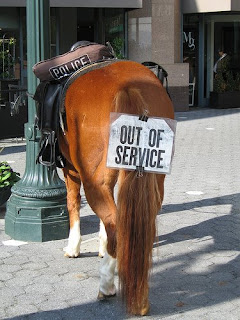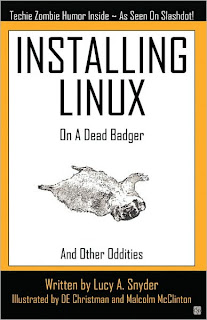 A week or so ago, The Wife and I were watching previews before some movie or another, and one came up for Lost in Austen. When the preview ended, my wife whipped her head right around to look at me and said forcefully, "We have to get that one." And so we did.
A week or so ago, The Wife and I were watching previews before some movie or another, and one came up for Lost in Austen. When the preview ended, my wife whipped her head right around to look at me and said forcefully, "We have to get that one." And so we did.Amanda Price is a modern young woman; she lives in a Hammersmith flat with her obligatory black (and slightly predatory) roommate Pirhana, has an only moderately loutish boyfriend, and does something for a bank that requires dealing with the public. But what she really cares about, this movie tells us, is re-re-re-reading Pride and Prejudice all of the time.
And that comes in handy -- though not as much as it could have; she apparently has never looked at the scholarly apparatus in her Penguin Classics edition or had a moment's thought about the social setup of Regency England -- when Elizabeth Bennett slips through a hidden door in her bathroom. Soon Amanda finds herself in Pride and Prejudice, and unable to go back home.
She then bumbles around for a while, gawking at all of the characters that she recognizes, and making comments about how she expects the story to go, until, by her presence (essentially in place of Elizabeth, who has stayed on the 21st century side of the door, doing what we do not know) she changes everything.
Amanda has definite elements of the Mary Sue; nearly all of the men want to marry her at one point or another, and all of them admire her much more than they should. (She's rough, uncouth, almost completely unmannered by their standards, criminally ignorant of everything, and her conversation is elliptical when it's not full of non sequiturs.)
But eventually -- and it's a long eventually, since this was originally a
The writing is quite good, particular for the P&P characters; their dialogue sounded to me like Austenite speech even when it was original. And the acting is quite good, too. But the character of Amanda is so much of a bull in a china shop that I found it hard to believe in her -- surely a woman who has devoted so much of her life to reading this one novel would have some clue about the society it depicts? Surely she can't be that thoughtless and dull?
There are a number of places the plot seems about to jump into a more interesting track -- one character felt like another potential person from the 21st century, but nothing came of that; Elizabeth's adventures in our world are left to the imagination; and the possibility of the P&P characters discovering the copy of the book that Amanda brought in and altering their behavior because of that comes to one tear-jerkingly "dramatic" confrontation scene -- but it never quite does. Lost in Austen stays always in the safe BBC costume drama mode, enlivened only by casting a slightly more intelligent and less clumsy Bridget Jones at its center.
It will be enjoyed most by groups of women, particularly those who have not yet gotten over the sight of Colin Firth in a pond. (Mr. Firth makes no appearance in this production, but his spirit pervades it.)
----------------
Listening to: Dish - Chase My Ghost
via FoxyTunes

















